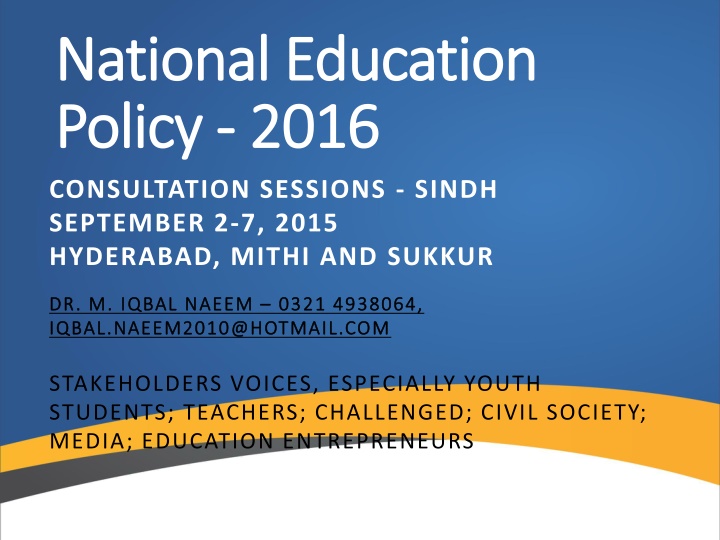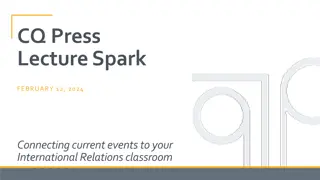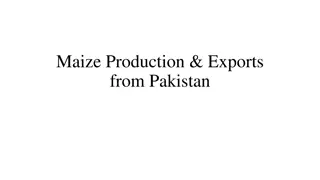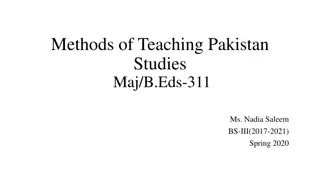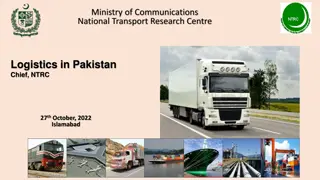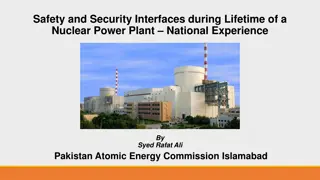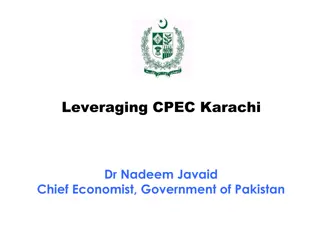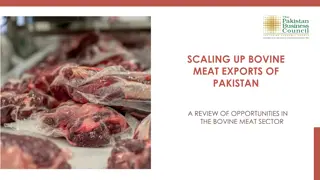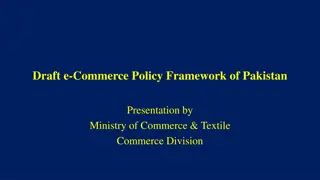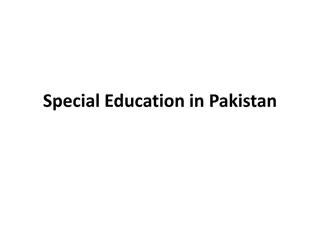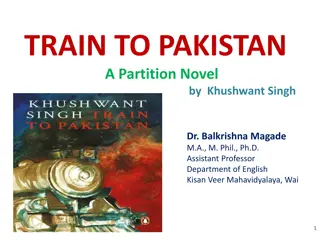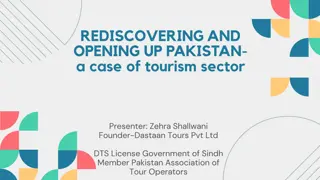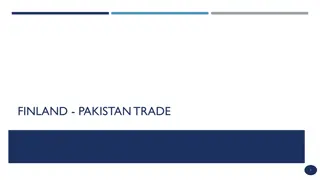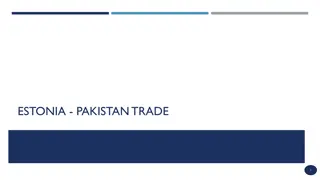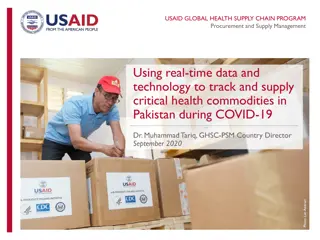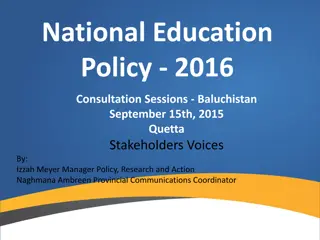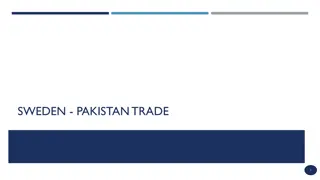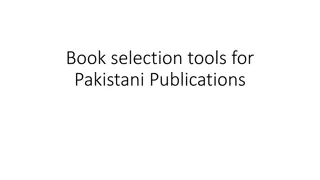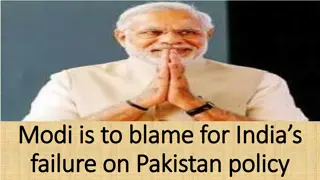National Education Policy in Pakistan: A Historical Overview
The National Education Policy in Pakistan has evolved over the years, from the First Educational Conference in 1947 to the more recent revisions in 2009. The 18th Amendment in 2010 decentralized decision-making to the provinces, emphasizing free and compulsory education for children aged five to sixteen. Despite efforts, challenges persist in achieving Universal Primary Education and literacy goals. The need for revising the policy to align with devolved structures, address neglected areas like special education and ICT, and integrate Sustainable Development Goals is crucial for progress.
Uploaded on Sep 24, 2024 | 1 Views
Download Presentation

Please find below an Image/Link to download the presentation.
The content on the website is provided AS IS for your information and personal use only. It may not be sold, licensed, or shared on other websites without obtaining consent from the author.If you encounter any issues during the download, it is possible that the publisher has removed the file from their server.
You are allowed to download the files provided on this website for personal or commercial use, subject to the condition that they are used lawfully. All files are the property of their respective owners.
The content on the website is provided AS IS for your information and personal use only. It may not be sold, licensed, or shared on other websites without obtaining consent from the author.
E N D
Presentation Transcript
National Education National Education Policy Policy - - 2016 2016 CONSULTATION SESSIONS - SINDH SEPTEMBER 2-7, 2015 HYDERABAD, MITHI AND SUKKUR DR. M. DR. M. IQBAL IQBAL.NAEEM2010@HOTMAIL.COM IQBAL.NAEEM2010@HOTMAIL.COM IQBAL NAEEM NAEEM 0321 4938064, 0321 4938064, STAKEHOLDERS VOICES, ESPECIALLY YOUTH STUDENTS; TEACHERS; CHALLENGED; CIVIL SOCIETY; MEDIA; EDUCATION ENTREPRENEURS
National Education Policy- Chronology of Policies 1947-2015 First Educational Conference, 1947 Report of the Commission on National Education, 1959 Education Policy, 1970 The Education Policy, 1972-1980 National Education Policy and Implementation Programs, 1979 National Education Policy, 1992-2002 National Education Policy, 1998-2010 Educational Sector Reforms, 2001 National Education Policy, 2009
18thAmendment April 19, 2010 Abolishing the concurrent list transferring the residuary powers to provinces for 47 subjects including Education and Health This led to major shifts in entitlements, decision making and responsibilities across the federation. Subjects on which both federal and provincial governments could make laws were devolved completely to the provinces with the abolition of the concurrent list
Constitution of Pakistan Article 25-A - 2010 Fundamental Right to Education The State shall provide free and compulsory education to all children of the age five to sixteen years in such manner may be determined by law
Revision of Revision of National Education Policy (NEP) 2009 National Education Policy (NEP) 2009 Despite its efforts, Pakistan is still falling short on its commitment to achieve Universal Primary Education (UPE) and desired literacy rates (87% by 2015 EFA- NPA) The need to review the NEP 2009 is essential so we can: match and upgrade decision making aligned to the devolved provincial set up and in light of article 25-A Address areas previously neglected in NEP 2009- e.g.Special/inclusive Education; ICTs; Integrate the upcoming Sustainable Development Goals (SDGs) especially SDG# 4 and its 10 targets for education (to be finalized September 2015 globally) ; this replaces the MDGs. Sadly Pakistan remains off track to meet the MDGs (Goals 2 on UPE and 3 on Gender Equality ) Identify the role of the community as a major support and accountability forum
Government Recommended Framework for NEP 2009 The federal government has proposed a set of general guidelines These include: Revision of the vision, mission, and objectives of the policy All chapters to be revised in light of the 18thamendment The new policy document will be theme specific rather than subsector specific Policy should be accompanied by an implementation framework, annual targets, and estimated costs A recommended layout of the policy framework is as follows:
Vision NEP 2009 Vision: Our education system must provide quality education to our children and youth to enable them to realize their individual potential and contribute to development of society and nation, creating a sense of Pakistani nationhood, the concepts of tolerance, social justice, democracy, their regional and local culture and history based on the basic ideology enunciated in the Constitution of the Islamic Republic of Pakistan. ( Source: NEP 2009 pg. 17) Recrafting the Vision for NEP 2016 Elements can be suggested by all and one group can work on this
Source: Ministry of Planning, Development and Reforms 2015 http://www.pc.gov.pk/wp-content/uploads/2015/05/Vision-2025-Executive- Summary.pdf
NEP 2009 themes NEP 2016- proposed themes /areas National Education Policy: Challenges and Deficiencies Access for all levels (ECE to Higher Education incl. TVET, NFE/Literacy- mindful of inclusive education, public and private sector/madrassahs) Quality (for all Levels underscoring learning outcomes and ICTs in all delivery systems) Fulfilling the Commitment Gap Fulfilling the Implementation Gap Public Private Partnership at all levels/services Islamic Education Medium of Instruction challenges Language Issues Broadening the Base and Achieving Access Teaching of Foreign Languages- English /Others Revival, Strengthening, and Activation of the role of National Cadet Core, Boys Scout, and Girls Guide Raising the Quality of Education Strengthening Skill Development and Innovation Islamic Education Higher Education Sports, Games- Life Skills Based Education (LSBE) Implementation Framework Coordination and Linkages The State of Pakistan s Education Political Will and Commitment Research, Training, and Database Creation Management/Administration/Monitoring of the Respective Sub-Sector of Education National Commitments 25 A; its rules/implementation- in each province/area Global Commitments and Trends SDGs ICTs- Climate Change: Knowledge creation & management
Sustainable Development Goals (SDGs) Sustainable Development Goals (SDGs) 2015 2015- -2030 2030 (after MDGs) (after MDGs) 1. End poverty in all its forms everywhere 2. End hunger, achieve food security and improve nutrition and promote sustainable agriculture 3. Ensure healthy lives and promote well-being for all ages 4. Ensure inclusive and equitable quality education and promote life-long learning opportunities 5. Achieve gender equality and empower all women and girls 6. Ensure availability and sustainable management of water and sanitation for all 7. Ensure access to affordable, reliable, sustainable and modern energy for all 8. Promote sustained growth, inclusive and sustainable economic growth, full and productive employment and decent work for al 9. Build resilient infrastructure, promote inclusive and sustainable industrialization and foster innovation
SDGs Contd 10. Reduce inequality within and among countries 11. Make cities and human settlements inclusive, safe, resilient, and sustainable 12. Ensure sustainable consumption and production patterns 13. Take urgent action to combat climate change and its impacts 14. Conserve and sustainably use the oceans, seas and marine resources for sustainable development 15. Protect, restore and promote sustainable use for terrestrial ecosystems, sustainably manage forests, combat desertification, and halt and reverse land degradation and halt biodiversity loss 16. Promote peaceful and inclusive societies for sustainable development, provide access to justice for all and build effective, accountable and inclusive institutions at all levels 17. Strengthen the means of implementation and revitalize the global partnership for sustainable development
MDGs had 2 targets and EFA 6 goals we now have SDG MDGs had 2 targets and EFA 6 goals we now have SDG 4 Goal & 10 targets 4 Goal & 10 targets SDG Goal 4: Ensure inclusive and equitable education and promote life- long learning opportunities. 4.1. quality primary and secondary education leading to relevant and effective learning outcomes (Right to Education) by 2030 ensure all girls and boys complete free, equitable and 4.2. childhood development, care and pre-primary education so they are ready for primary education (Early Childhood Education) by 2030 ensure all girls and boys have access to quality early 4.3. and quality technical, vocational and tertiary education, including university By 2030, ensure equal access for all women and men to affordable 4.4. who have relevant skills, including technical and vocational skills, for employment, decent jobs and entrepreneurship By 2030, increase by [x] per cent the number of youth and adults
4.5. ensure equal access to all vocational training for the vulnerable, including persons with disabilities, indigenous peoples and children in vulnerable situations 4.6. By 2030, ensure that all youth and at least [x] per cent of adults, both men and women, achieve literacy and numeracy 4.7. By 2030, ensure that all learners acquire the knowledge and skills needed to promote sustainable development, including, among others, through education for sustainable development and sustainable lifestyles, human rights, gender equality, promotion of a culture of peace and nonviolence, global citizenship and appreciation of cultural diversity and of culture s contribution to sustainable development By 2030, eliminate gender disparities in education and levels of education and
4.a. gender sensitive and provide safe, non-violent, inclusive and effective learning environments for all Build and upgrade education facilities that are child, disability and 4.b. scholarships available to developing countries, in particular least developed countries, small island developing States and African countries, for enrolment in higher education, including vocational training and information and communications technology, technical, engineering and scientific programmes, in developed countries and other developing countries By 2020, expand by [x] per cent globally the number of 4.c. including through international cooperation for teacher training in developing countries, especially least developed countries and Small Island developing States By 2030, increase by [x] per cent the supply of qualified teachers,
Provincial Priorities - Sindh Amongst the provinces Sindh the first one to host the provincial NEP 2016 consultation on August 15, 2015 led by Dr. Fauzia Khan Director Curriculum Wing at Education and Literacy Department (E&LD); she is the focal person on NEP 2016 for Sindh on behalf of the IPEM C. Sindh s Priorities include: Strengthening education management and governance Enhance gender equity Enhancing public private partnerships Enhancing social cohesion Policy action for education in emergencies Enhance use of ICT for learning and monitoring (The Sindh Education Sector Plan segments for 2014-2018 can be found in your folders.)
Targets Consultative process at divisional, district, and tehsil level Involvement of all stakeholders especial focus on YOUTH groups: drawn from teachers, head-teachers, students, media, CSOs, enterprise , inclusive groups etc. public and private sector including SEF Redefining roles of stakeholders Draft recommendations matching ground realities Present in the provincial workshop Place in the NEP- RC for Inter Provincial Education Ministerial (IPEM)committee/forum (more details on existing targets can be found in Sindh Education sub-sector plans 2014-2017/18)
Breakout Session Groups Breakout Session Groups Quality and Access discussed for each sub Quality and Access discussed for each sub- -sector sector 1. Vision and Mission core principles 2. Early Childhood Education 3. Primary Education 4. Secondary Education 5. TEVT and Special Education 6. NFE and Adult For groups 1-6 please do consider the following: curriculum, textbooks, supplementary materials teacher education, assessment, ICTs enabled learning, protection/Life Skills Based Education (LSBE), ethics, citizenship education, inquiry based learning pedagogies etc. 7. Governance and Financing 8. Madrassas 9. Inclusive/special education
Guidelines for Analysis and Policy Recommendations Implementation of Right to Education 25-A in Sindh an urgent matter awaiting rules Gender Equality and Non-discrimination Vision and Integration of SDG4 and targets in the NEP 2016 Issues and recommendations for quality and learning/assessment in each sub-sector : Teacher Education Pre and In-service Licensing and certification Issues of access across each thematic area- norms of school construction, space and buildings/facilities Protecting our children child rights non-discrimination- ending child marriages in Sindh - measures for emergencies Role of technologies/ICT and innovations in improving learning and governance Integrating climate change; Life skills based education (LSBE), child protection, ending child marriages, human rights & citizenship in teacher education, classrooms and schools Governance of education system: SMCs; District; Provincial level and strong M&E Systems Public Private Partnerships in public sector service delivery all levels; quality & financing Financing of education raising the budgets for standards and ensuring utilization
For NEP 2016 Reference Documents & Suggestions Website for NEP 2016 : http://itacec.org/nep.php Polls and Your suggestions Email your suggestions: ..
